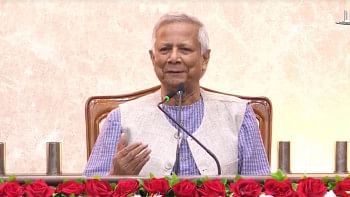A time-tested partnership
Turkey has been a longstanding and time-tested partner for Bangladesh. The ties between the people of Bangladesh and Turkey are rooted in history that dates back to even before the two countries emerged as modern nation-states. The rebel poet of Bengal Kazi Nazrul Islam, for example, wrote in praise of Mustafa Kemal Ataturk's bravery in the Turkish War of Independence: "To chase out the invading aggressor/ We need, indeed, a fearless Kemal/ Kemal, what a wonder you've worked!/ Ho Ho Kemal, what a wonder you've worked!" (Kemal Pasha, 1921).
After Bangladesh secured independence, relations between the two countries flourished following Turkey's recognition of the country as a new independent state in 1974. Over the years, their partnership has strengthened and now Bangladesh and Turkey cooperate in many areas including trade, defence, foreign investment and education.
The current two-way annual trade between Turkey and Bangladesh stands at $1 billion. The two countries aim to double this value within the next five years through increased cooperation among economic actors, simplification of trade rules, and diversification of trade products.
Turkish companies are keen on investing in and collaborating with their Bangladeshi counterparts in numerous sectors such as jute, light engineering, pharmaceuticals, ICT, shipbuilding, energy, and household appliances.
There are also wide-ranging opportunities for Bangladesh nationals to invest in Turkey.
The two countries are also stepping up their defence ties and in June this year, Bangladesh signed a defence purchase agreement with Turkey for importing various equipment from Roketsan, a Turkish military hardware company and contractor. According to local experts, these products will equip the Bangladesh Armed Forces with NATO standard air, land and naval warfare capabilities.
The mark of a true ally can be seen during crisis moments and this has been reflected in Turkey's unconditional support to Bangladesh on the Rohingya issue at various multilateral fora such as the UN, ICJ, G20, and OIC. Turkey has also been providing humanitarian aid, particularly in the field of health, education and rehabilitation, to Rohingya refugees in Bangladesh.
While both Bangladesh and Turkey are Muslim majority countries, their ties run deeper. People of both nations follow Sufism and there is a wide appreciation of the works of famous Turkish poet and Sufi mystic Mawlana Jelaleddin Rumi among Bangladeshis.
Turkish television programmes are also very popular in Bangladesh. Popular Turkish historical dramas such as "Dirilis Ertugrul" (Resurrection Ertugrul) and "Muhtesem Yuzyıl" (Magnificent Century) have even been dubbed in the local language for Bangladeshi audiences.
Turkey is a popular tourist destination for the people of Bangladesh with around 18,000 Bangladeshi nationals having visited Turkey in 2018 alone.
Currently, around 600 Bangladeshis are studying in different Turkish universities. The government of Turkey regularly provides scholarships to Bangladeshi students to study in their most prestigious universities.
There is the potential to take bilateral relations between Turkey and Bangladesh to even greater levels. So, new avenues of cooperation should be explored to deepen the ties between the government and private sector of both countries. The people-to-people contact between the two nations also needs to be promoted to consolidate the gains from the improved relationship.

 For all latest news, follow The Daily Star's Google News channel.
For all latest news, follow The Daily Star's Google News channel. 



Comments